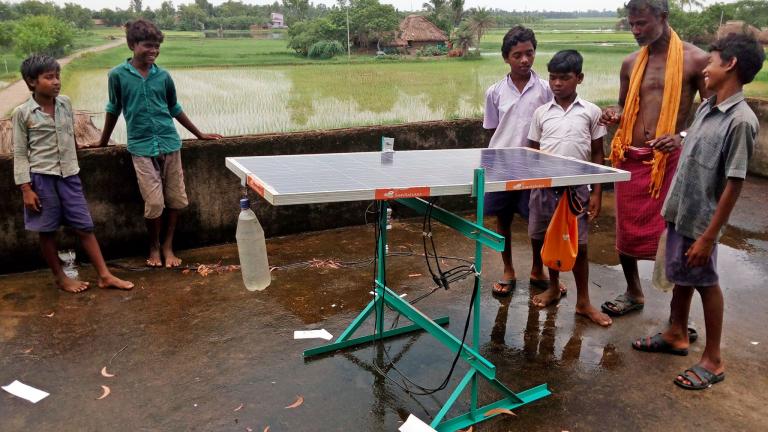
Climate CoLab Grand Prize Winner, Eden Full Goh, and SunSaluter Director, Victoria Alleyne, are making solar energy efficient and accessible in the developing world, through SunSaluter. SunSaluter is a solar panel that rotates throughout the day to maximize sun exposure and energy conversion. Compared to other solar panels, SunSaluter produces 30-40% more energy, through its rotation functionality. After several iterations--both in the lab and real-world sites-- SunSaluter has been designed in an intuitive way that does not require extensive technical knowledge to install or maintain.
Eden Full Goh is the founder of SunSaluter, which began in 2006 as Eden’s high school science fair project. Eden elaborates on the inspiration, stating: “Growing up in Calgary, Canada, which is a hub for the oil and gas industry, I became curious about renewable energy and other ways to work towards more sustainable climate solutions.” Eden’s interest in sustainability and engineering continued at Princeton University, where she studied mechanical engineering and became a Thiel Fellow.
When bringing SunSaluter to local sites, such as India and Kenya, Eden noted the importance of designing the technology so that it could be installed and repaired using the resources available to those communities. Eden, Victoria, and the SunSaluter team decided to make the design open source, so that it could be accessible to anyone. In fact, the SunSaluter website features step-by-step instructions on installation.
Commenting on the expansion of the SunSaluter technology, Eden explains “over the last few years, our team has impacted over 17,000 people in 19 countries with our work. After developing over 60 prototypes in collaboration with other innovators in communities with SunSaluter deployments, as well as the implementation organizations that work with us on the ground, we made the decision to open source our SunSaluter design. We believe the SunSaluter can reach so many more people than we can as a small organization.” In addition to the technology itself, SunSaluter evolved into a 501(c)3 organization, designed to implement solar energy in the developing world, and address related social justice issues.
While providing energy is SunSaluter’s main impact, it has also helped with education, health care, and discrimination issues within communities. Ms. Begum, of Haryana, India, describes how the SunSaluter has provided electricity, allowing her children to study at night, and cooling for their home during the intense summers.
Commenting on the Climate CoLab win, Eden states, “we met lots of great people and made many connections through the online platform and the in-person events in Boston. The award we received went towards SunSaluter’s operating expenses, which was invaluable in getting to where we are now.” The SunSaluter team hopes to expand the implementation of SunSaluters globally, bringing clean energy and climate justice to frontline communities.
If you’re interested in SunSaluter, learn more about their team, technology, and impact here.





